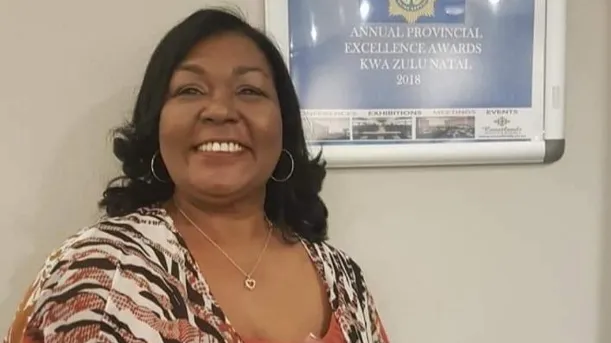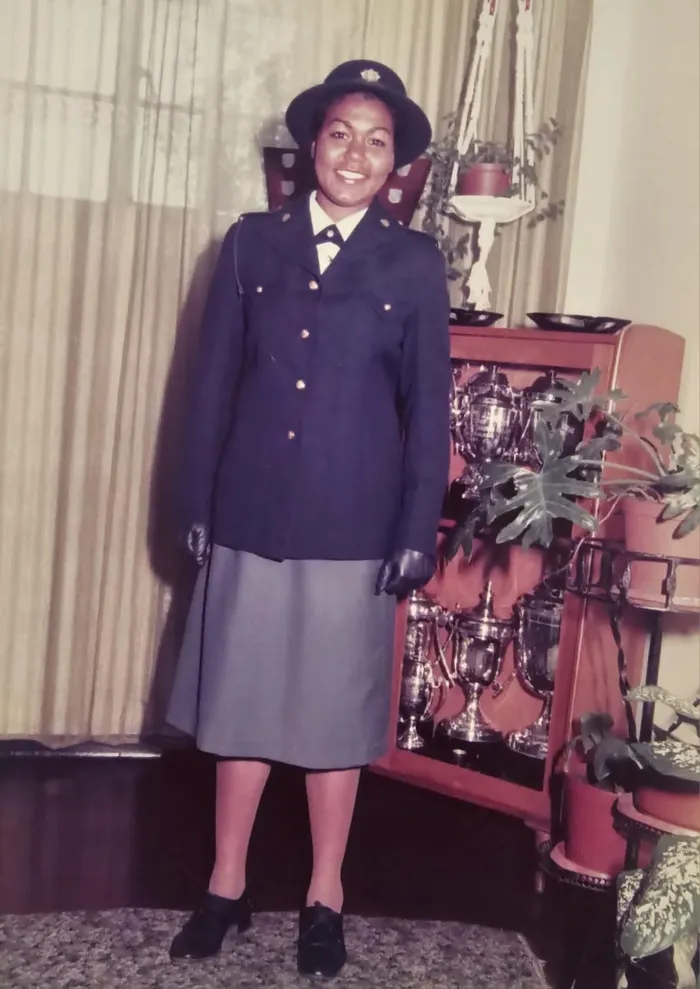
Captain Gay Munira Ebrahim.
Image: Supplied
POST reporter, NADIA KHAN, shares the inspiring journey of a retired South African Police Service (SAPS) officer, Captain Gay Munira Ebrahim, whose dedication and resilience have left an indelible mark on the community and the fight against crime. She is also featured in the University of KwaZulu-Natal’s Gandhi-Luthuli Documentation Centre’s website gallery entitled, South African Police Indian Veteran. The centre serves as both a living archive and a tribute to the Indian community's legacy in South Africa.
Retired Captain Gay Munira Ebrahim, 61, of Pietermaritzburg, enlisted in the SAPS in 1983.
She said after matriculating at Pietermaritzburg Indian Girls' High School in 1981, she was employed as an administrative clerk.
“My career dream as a child was to become a language teacher. I have always had a flair for languages and participated in several speech contests and school debating teams. However, due to financial constraints, this did not materialise. My parents could not afford to pay for my tertiary education.
“I was fortunate to land a job straight after matric as an administrative clerk at a motor vehicle dealership in 1982. It was while working there, that a policeman came in to buy a vehicle and while engaging with him, he informed me that the police service was recruiting non-white females. He advised me of the application procedure, and I decided to pursue it,” she said.
Ebrahim said the concept of a non-white police woman was new and daunting as there were none in Pietermaritzburg.
“This presented as a challenge to me, which made me more enthusiastic to overcome. I was enthralled with the uniform and an opportunity to venture into an unknown territory. I took that as being a personal challenge.”
She was enlisted at the Cator Manor Police Training College in Durban on January 20, 1983.
“I was one of 18 recruits who started a six month basic police training. We were the second batch of recruits and officially known as troop 2. The training consisted of intense physical training, use of firearms, academic lectures and examinations of law subjects. This training was definitely not for the faint-hearted. The men and women did the exact training.”

Ebrahim joined the South African Police Service in 1983.
Image: Supplied
Ebrahim said she completed the training on her 19th birthday on June 29, 1983, and was deployed to Mountain Rise Police Station in Pietermaritzburg.
“I served there for two years and was then transferred to Plessislaer Police Station, which was an area on the outskirts of the city that was under-developed and classified as an area for only black people. I was the only Indian woman who worked shifts and attended complaints in the outlying areas. I served at the station for five years.
“During 1990, I was transferred to the District Commissioner's Office in Pietermaritzburg, and served there for four years until I was transferred back to Mountain Rise Police Station. By this time, I had passed the rank of constable and sergeant and was promoted to warrant officer in 1994,” she said.
The mother of two said during this time she studied via correspondence and completed a national diploma in police administration.
“I did this while juggling a demanding career, being a wife and mother, and running a home. I also successfully completed several internal courses that the police service offered.”
Ebrahim said her tenure in the police included several job descriptions, which included working at a community service centre, general enquiries unit, in a patrol van attending complaints, and in the visible policing unit doing crime prevention and field operations.
“For the last five years of my career, I held the position as corporate communications and liaison officer until my retirement on June 30, 2020.”
Ebrahim said she encountered several challenges.
“I was met with a lot of discrimination being the first policewoman at my station. ‘How dare I enter a completely male domain’. The mindset was because I am a woman, I will never be able to do what men do. So I had to work ten times harder to prove myself. Men didn’t want women to take over.
“It was also the apartheid era. I was allowed to be a crew member in the police vehicle but I was not allowed to drive. Because I was not white, I was not allowed to sit in the front of the police van and had to sit at the back of the van irrespective of rank. We were not even allowed to use the same toilets or the same entrances to the police station.
“Trousers were not part of the female uniform, so I wore a skirt and stockings every day and night irrespective of what duties I performed. I also had to wear a bulletproof vest designed only for males. I had to carry a handbag at all times as my firearm and handcuffs had to be in my handbag. I realised that the situation was what it was and I could either sink or swim. So, I toughened up, empowered myself and to this day can hold my own counsel,” she said.
Ebrahim said each rank and scope of work had its own highs.
“I have saved an abandoned, newborn baby, talked somebody out of committing suicide, and arrested dangerous, wanted suspects while out on an operation. I also empowered victims of gender-based violence, and received accolades and prestige awards for my hard work at a national level.
“However, what stands out for me in my career was when President Nelson Mandela marked his 78th birthday by holding a party for disadvantaged and disabled children from around the country at Hilton College in 1996. I had the pleasure of working at the event for several days and the honour of meeting him,” she said.
Ebrahim said it was an honour to serve her country, and give back to the community because “it took a village to raise me”.
“This is not a job, it is a vocation. It has humbled me and taught me to live each day as if it is my last. It has taught me to treat and talk to colleagues and the community how I would like to be treated and spoken to.
“Any police official that leaves for work does not know if he or she will return to their families at the end of the day, so be kind and accommodating. Make a difference in somebody’s life. It is all about compassion and empathy,” she said.
Ebrahim said she still did community work related to gender-based violence.
Related Topics: